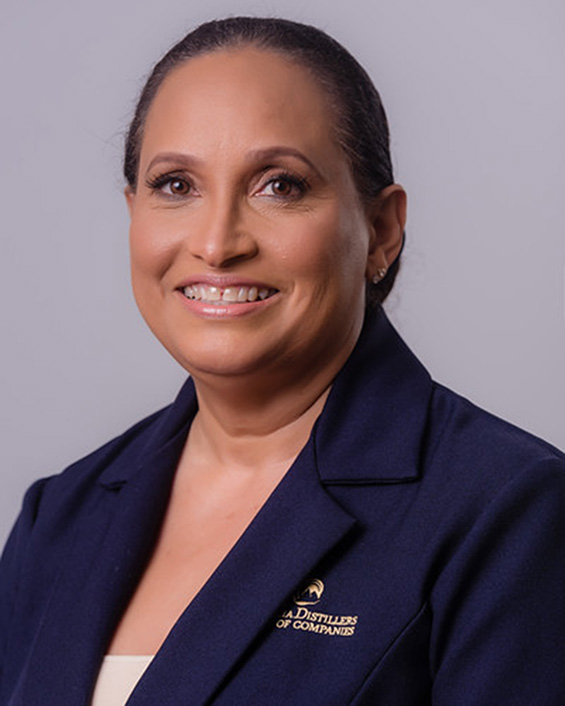Rum Connoisseur Interview Of The Week MARGARET MONPLAISIR CEO of St. Lucia Distillers Ltd

Rum Connoisseur
Interview of The Week:

MARGARET MONPLAISIR
CEO of St. Lucia Distillers Ltd
1. Who is Margaret Monplaisir
I have served on the Management team of the St. Lucia Distillers Group of Companies (SLD Group) for thirty-five years. My career path and personal growth are intertwined with the growth and success of the SLD Group.
I was hired as General Manager of Barbay Ltd. in 1984, which became the distribution arm of the SLD Group in 1994. At that time I was appointed as Commercial Director with responsibility for Sales & Marketing and Distribution for the SLD Group.
In 1994 I also joined the Board of Directors of the SLD Group and became part of the team that was instrumental in leading the Company to where it is today.
Over the years my role in management expanded as I assumed responsibility in additional areas including Human Resource, Tours, Security, Administration and Health and Safety.
In October 2013 I was appointed as Managing Director of the Group, after having acted in the position for two years, and I was recently reassigned to the position of CEO.
I earned an MBA in General Management from the University of the West Indies in 2006 and I am an Accredited Director with the ICSA.
2. What does the rum mean for you? What made you fall in love with rum and when did it happen?
Rum plays a significant role in our culture and our history. It was around long before my grandparents and will be around after my grandchildren are gone. In Saint Lucia, rum is served at every event, whether it be a christening or a wake; as medicine (It is consumed with honey and lime as a remedy for the cold; for cooking (especially to soak the fruits at Christmas for the traditional Christmas fruit cake). A bottle of rum will be found in nearly every home in Saint Lucia. Working with and being mentored by Laurie Barnard who was the Chairman of St. Lucia Distillers, I could not help but develop a passion for rum. Under Laurie’s tutelage I learned about the rum making process, which while being scientific, involves a lot of artistry and skill. You must first make the distillates, then age the rum, before blending. Blending is by far the most fascinating part of the process as the master blender is like an artiste with a wide range of rums blending them together to create unique and different rums. Laurie Barnard always sought to create new rums, by buying pot stills; ageing in different barrels; experimenting with various yeasts and using both molasses and sugar cane juice. One of my favorite activities is helping to select a new blend from a number of options prepared by the Master Blender.
- Three essential characteristics that define the rum according to your perspective.
- Rum must be made from a sugarcane based raw material (molasses or sugarcane juice),
- The country of origin has to be the country in which fermentation and distillation takes place;
- The rum can only be aged in wooden barrels.
3. What is the most important contribution you have made in the rum industry?
Spreading the message of the importance of rum to saint Lucia. My contributions to date have mainly been in Saint Lucia, spreading the message of the importance of rum to Saint Lucia, educating Saint Lucians and the Government on rum and getting them to have a new appreciation for rum. Having grown up with rum being the lowest priced of the spirits in our market, it takes some convincing for Saint Lucians not to take rum for granted.
4. Benefits that the rum industry has given you.
I earn my livelihood from the rum industry; I have been able to make a career in this industry and even broke the glass ceiling by becoming a female Managing Director and then CEO of a distillery. This is an accomplishment that not many women in the rum industry, and even other industries have been able to achieve.
5. What’s another thing you are passionate about, in addition to rum? Why?
Health and fitness is my other passion. I believe in people living a balanced lifestyle. We need a social life. A drink or two with family and friends does a lot for our mental health. However, in order to stay healthy, we must remain active; participate in a sport or other physical activity. I do Crossfit 4 times per week and I try to make healthy choices with my eating, focusing mostly on natural locally grown foods.
6. What is your favorite place for drinking rum?
There is nothing better than relaxing with a drink on an evening while watching the sea as the sun sets. It is a beautiful and peaceful time of day. The sky lights up with pretty colors while the sun goes down and darkness takes over. Otherwise, I enjoy my rum while hanging out with friends at home.
7. Favorite drink + Recipe:
Chairman’s Reserve with ginger ale. Three parts ginger ale to one shot of Chairman’s Reserve and two cubes of ice.
8. Why is it important to educate the rum consumer?
Rum has a long history, with stories of pirates and the navy serving a daily tot of rum to sailors, but this causes it to not always be viewed as a premium spirit like other spirits; it is also perceived by many as containing more sugar than other spirits (probably because it is made from sugar cane based product). Consumers need to be taught about rum, they need it be taught about the complexity of the process, the uniqueness of the various stills, the transformation that occurs within various barrels and the creativity and craftsmanship that goes into the final blend. This is not a product that anyone can develop overnight. We need to educate, to dispel the idea that rum contains sugar. Rum, like other spirits including gin, vodka and whiskey are highly distilled and do not contain sugar unless it is added via the chaser it is being served with.
9. Any tips to train the palate and taste a good premium rum?
As someone who has received no formal training, I would say lots of practice. The rum should be pleasant on the nose; there should be oak, wood and fruitiness depending on the style of rum. A pot still rum tends to have a grassy/botanical note on the nose and palate. Aged older rums tend to have a long pleasant finish which lingers in your mouth.
10. How can the rum contribute to improving the crisis in some countries?
Many distilleries around the world including St. Lucia Distillers has had to allocate a percentage of our rum production to be used for sanitizing. This has allowed hospitals, schools, the air and seaports and the private sector to remain open. A significant quantity of the alcohol has been donated to the first responders.
The hospitality and entertainment industries have been affected significantly by the pandemic. This means that bartenders around the world are out of work. The rum industry can find creative ways to get bartenders to keep practicing and honing their skills. Examples of this happening include St. Lucia Distillers going ahead with our Chairman’s Spice Lab competition and WIRSPA spearheading a training program for bartenders.
11. Is the commitment to sustainable development the key of success for the permanence of the rum industry in the world? Why?
Sustainable development is important to any industry and everyone needs to be responsible in the investments and decisions we make. In the rum industry we have been working towards identifying alternative sources of energy; we practice water conservation (at St. Lucia Distillers our products are blended with rain water collected from the roofs of our buildings and our process water comes from a pond); we collect waste oil from garages and kitchens around the island to burn in our boilers, thus eliminating a disposal problem for these companies.
12. Who would you like to meet in the rum industry? What would you say to him/her?
Having been involved with rum for so many years I have been fortunate to meet many important people. However, I am yet to meet a female influencer in the rum industry who is not a technical person from the industry. My question to her would be how did you become interested in rum; what challenges is she facing in becoming an influencer for rum and how is she overcoming them?
I would also like to meet the CEO of one of the large companies and learn about their experience as head of such a large company. My main question would be how do you keep innovation and creativity alive in a large conglomerate?
13. What are your next goals in the rum industry?
In our company, to continue to innovate and create new rums, continuing to work on premiumizing the image of rum by producing high-end rums in superior packaging; working with WIRSPA to develop a standard for rum that is inclusive of all the members but is transparent and informative and does not limit innovation and creativity.
14. Plans you have when you leave the rum industry.
To pursue a PHD in business administration and to tutor and mentor young people going into business. There are many young people with great business ideas, but they don’t have the discipline and the skills and with the right mentorship they could become successful. I will however always be an ambassador for rum, telling the story of rum even after I retire.
15. Why is the role of the bartender important in the rum industry?
Bartenders play an important role in getting consumers to taste and drink rum. They are in direct contact with the consumer and can influence what and how they drink. Rum is quite versatile and can be consumed straight, with a chaser, or in a cocktail and it is up to the bartender to suggest the best option for the customer. Also, bartenders are exposed to a wide range of spirits and can therefore give critical feedback to the rum industry on our rums in terms of blends that work, the suitability of packaging and the desirability of rums versus the other spirits. With this information we can work on strengthening our industry.
16. What is your advice for new generations in the rum industry?
Rum has the history and the versatility to hold its own against any spirit in the alcohol beverage industry. Don’t be afraid to make the claim that rum is the best spirit in the world. You need to have a passion for rum to truly appreciate it and to get others to appreciate it. Take time to learn about rum; don’t be afraid to innovate and above all, continue to elevate the image of rum.
17. How can people learn more about you? Website? Social media page?
I can be contacted on Facebook, LinkedIn and Instagram as Margaret Monplaisir












